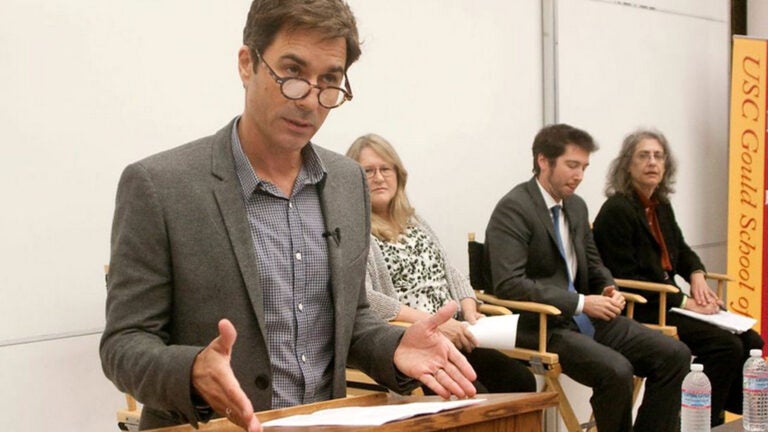
Eric McCormack discusses mental illness with panelists Jessie Close, Sam Brown and Elyn Saks. (Photo/Gregory Mancuso)
Eric McCormack joins panel on mental illness
Perception star speaks at Saks Institute lecture covering the complexity of people with schizophrenia
When actor Eric McCormack landed the role of a neuroscience professor with schizophrenia on TNT’s Perception, his primary goal was to get the portrayal right.
He met with mental health professionals, reviewed research on the disease and read Elyn Saks’ memoir, The Center Cannot Hold: My Journey Through Madness.
“I opened Elyn’s award-winning self portrait … and any doubts I had that a respected university professor with full-blown schizophrenia could possibly be a believable TV character vanished,” McCormack recently told a crowd of about 180 students, faculty and friends at a panel discussion sponsored by the Saks Institute for Mental Health, Law, Policy and Ethics.
As seen on TV
McCormack was one of three panelists invited to speak at the Saks Institute’s lecture, “In Real Life and as Seen on TV: Stories of Mental Health on Campus.” The goal of the discussion was to destigmatize mental illness on college campuses, in the media and society at large.
McCormack led the discussion with Jessie Close, a mental health activist with bipolar disorder and USC Gould School of Law student Sam Brown, who also has bipolar disorder. Saks, a USC Gould professor who directs the institute and was diagnosed with schizophrenia as a law student at Yale University, also joined the discussion.
So often, the media portray people with mental illness in a stereotypical light, which leads to stigma and fear.
Elyn Saks
“So often, the media portray people with mental illness in a stereotypical light, which leads to stigma and fear,” Saks said. “My goal is to show that people — with mental illness or not — are complex and should not be placed in a box. Bringing together this remarkable panel of people struggling with mental illness or playing one on television is a wonderful way to show that complexity.”
Bipolar struggles

Brown, a third-year law student at USC Gould and a 2013-14 Saks Institute Scholar, was diagnosed with bipolar disorder the summer before his freshman year at UCLA. He received successful treatment, but as a junior at UCLA, he experienced his second psychotic break.
“Whatever you want to say about UCLA, I’ve got to say my frat brothers saved my life,” he said. “They never judged me and helped me get through this experience as a college student.”
But when he entered law school, Brown decided not to share his condition with his fellow students. He kept quiet due to fears of stigma that he experienced when a summer camp where he worked did not want him to return due to his condition. He also worried that as a soon-to-be attorney, he could face further stigma.
“I only told one friend before today,” he said. “I thought maybe being tight-lipped wasn’t such a bad thing.”
Brown decided to share his story with the law school and broader community to help put a face on mental illness and destigmatize the condition.
Close calls
That has been Close’s decades-long mission. Along with her sister, actress Glenn Close, Jessie founded BringChange2Mind, an organization that works to put an accurate face on mental illness. She has written two books detailing her journey.
“I really did not come to terms with my illness until I was 50 years old,” she said. “When I was a student, people had no idea what mental illness was and how to treat it.”
She lacked a support system but continued to take classes at community college and eventually American University. “If you live with mental illness, take care of yourself, keep pushing, stay in school and don’t give up,” Close said. “You have to try, try, try again.”
McCormack said that hearing from the panelists further affirmed his commitment to accurately portray his role on Perception. He praised USC Gould for being on the “cutting edge of engagement” of mental health issues.
“To observe Elyn living with her disease for 40 years, being treated with such respect and reverence at her school is inspirational,” he said.
